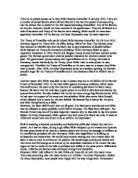Another reason why Hitler came to power was that there was almost constant economical crisis: the Great Inflation was barely overcome, when the Great Slump shook the country’s social and economic foundations. The agriculture was first to suffer from the decline in economics, before industry and commerce. Because it was protected against the foreign competition (1914 – 1924), the adjustments to the world-wide conditions were unavoidable, which automatically meant higher taxes, felt especially after the Great Inflation. The average of bankrupt farmsteads sold by auction between 1925 and 1932 increased from 31 to 190 (over 6 times more)3. In addition to that the farmland was divided and 89.4 per cent of rural population did not own bigger units of land than 20 hectares4. Because of that there was a massive protest movement and in 1928 peasants joined political demonstrations.
The Great Slump of 1929 affected also unemployment to a large extent. The Black Friday pushed the unemployment figure from 8.5 per cent in 1929 to some 14 per cent in 1930 of working class population. And less than 2 years later the rate reached almost 30 per cent5. This reflected in a huge interest with the Nazi party, whose popularity and increase in their support rose up to 6.4 million voters6. The overall poverty was increasing rapidly, which caused discontent among German society, especially the lower classes.
Moreover, unhappiness of the whole population was also caused by a deep anger about the First World War and the Treaty of Versailles, after which the German people felt betrayed. Therefore it is not surprising that these events created an underlying bitterness to which Hitler’s expansionism appealed and after the Locarno Treaty (Rhineland became a de-militarised zone), the Nazi leader made a good use of a populist propaganda.
Apart from these two motioned above; another very important reason why Hitler came to power was the fact that he was recruited by the President Hindenburg himself. In November 1932 elections the Nazis again failed to gain majority of seats in Reichstag (their share of the vote fell from 230 seats to only 1967. Fortunately for Hitler, he was ‘rescued’ by Hindenburg. Franz von Papen, who was a Chancellor at the time, could not gain enough support from the Reichstag, and therefore Hitler was offered the post of a vice-Chancellor in exchange for help. Hitler refused; he demanded to be the Chancellor, which was the most direct reason of Hitler gaining power over the German state.
One cannot forget though about Hitler’s personal qualities, which enabled him to take over Germany. First of all, he was characterised by fantastic strategic and organisational skills. His rise to power was planned in details. Also, thanks to his self-esteem, belief in himself and the fact that he was a brilliant speaker, he was able to persuade people to vote for the Nazi party and follow him. The propaganda was not without significance either, which made people believe that in the critical situation in Germany, Hitler is their last and only hope.
To sum up, one can divide the reasons of Hitler’s rise to power into long-term and short-term factors. The former were the bitterness of the German population caused by dissatisfaction with after-war period and the Treaty of Versailles. Furthermore, because of the weaknesses and failure of the constitution, many people de facto wanted a return of dictatorship and when the crisis of 1929 – 1933 came, there was no one, who was able or prepared to fight against this powerful man. The propaganda and the party’s programme, which promised everybody some benefits from Hitler’s power, as well as his personal qualities, belong to the long-term conditions.
To the short-term conditions belong the Wall Street Crush of 1929 and the following crises (the people did not have anybody to blame and sought extreme solutions, which were offered by Hitler) and Hindenburg’s decision to recruit him As the Chancellor.
When one take all the reasons into consideration, it is not surprising that Hitler came to power in 1933. During the political and economic crisis, people are likely to turn to radical solutions, and with help of well-planned propaganda they cannot help thinking that these are the right ones.
References:
1 – ‘Hitler and collapse of Weimar Germany’ – Martin Broszat (Berg Publishers Ltd., 1987)
2 - ‘Hitler and collapse of Weimar Germany’ – Martin Broszat (Berg Publishers Ltd., 1987)
3 – ‘Modern Germany. Society, economy and politics in the twentieth century’ – V.R.Berghahn (Cambridge University Press, 1982)
4 - ‘Hitler and collapse of Weimar Germany’ – Martin Broszat (Berg Publishers Ltd., 1987)
5 – ‘A history of modern Germany. 1840 – 1945’ – Hajo Holborn (Eyre and Spottiswoode, 1969)
6 – ‘Hitler. 1889 – 1936: Hubris’ – Ian Kershaw (the Pengyin Press, 1998)
7 – ibid.
Bibliography:
‘Hitler and collapse of Weimar Germany’ – Martin Broszat
‘Modern Germany. Society, economy and politics in the twentieth century’ – V.R.Berghahn
‘A history of modern Germany. 1840 – 1945’ – Hajo Holborn
‘The divided nation. A history of Germany. 1918 – 1990’ – Mary Fulbrook
‘Hitler. 1889 – 1936: Hubris’ – Ian Kershaw
‘Modern Germany reconsidered. 1870 – 1945’ – Gordon Martel (Routledge, 1992)







